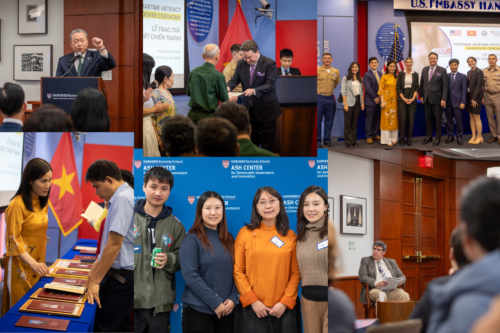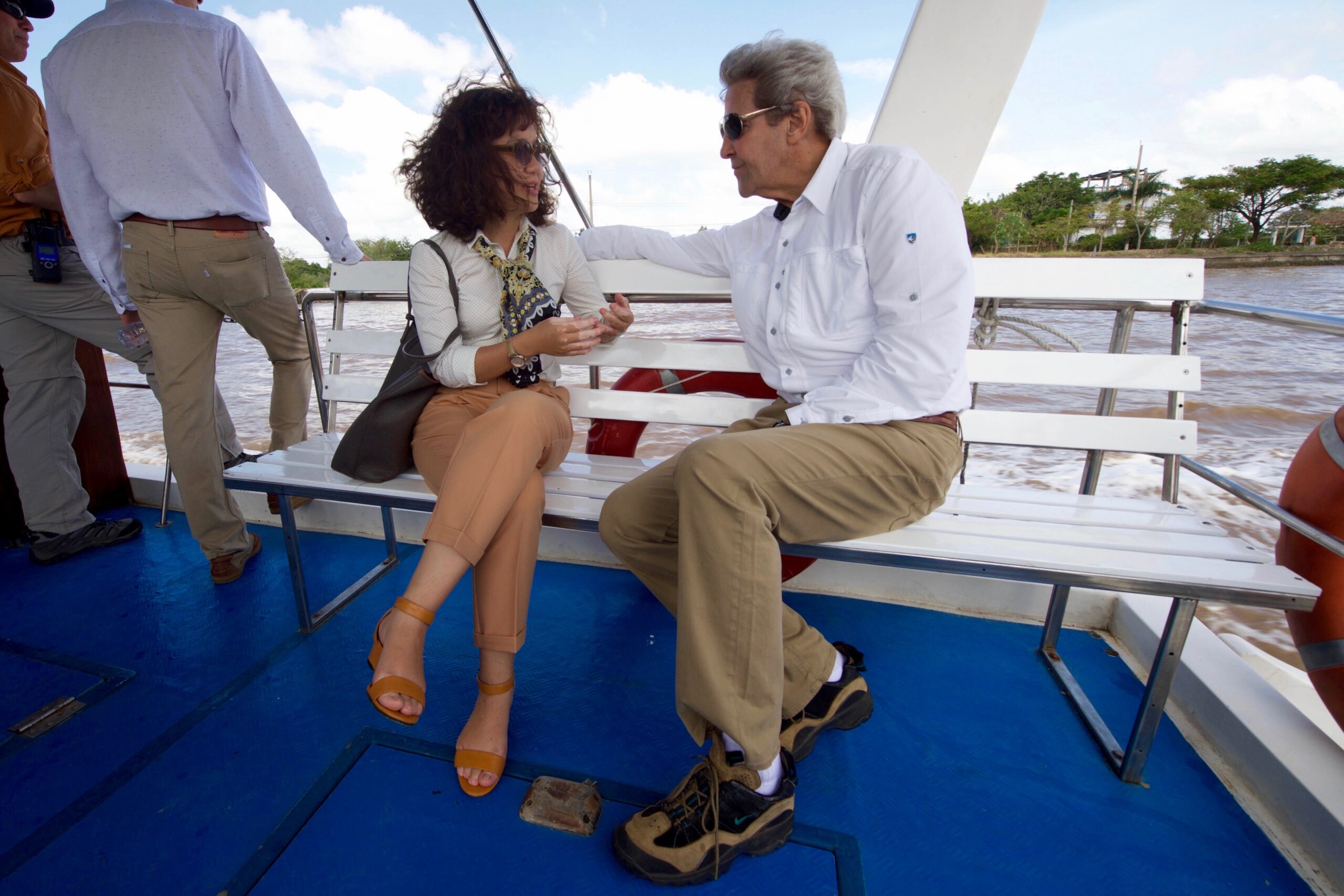A small, intensely blue, frozen pool sits isolated in a sparsely populated area of the Tibetan Plateau in Qinghai, China. It is hard to imagine, but this bit of ice, the Lasagongma Spring, is the start of a river that serves as the lifeblood to 60 million people.
With spring’s arrival, the ice melts and the pool is awash as mountain snows turn to water and flood the valley. Ultimately, the water will flow through China, Laos, Myanmar, Thailand, Cambodia, and Vietnam, entering Vietnam’s Mekong Delta and then emptying into the South China Sea (or the East Sea to the Vietnamese). In total, the waters of the Greater Mekong Basin help feed an estimated 300 million people a year.
Though Lasagongma Spring appears pristine, as the water flows down 4,350 kilometers (2,703 miles) to the delta, it will become increasingly muddied, polluted, and salinized. “Today,” says Malcolm McPherson, Senior Fellow in Development for the Ash Center’s Vietnam Program, “not only is the Lower Mekong region one of the most highly productive agricultural areas, but it is also becoming one of the most polluted.”
Understanding the Problem
In response to these growing concerns, the Ash Center and the predecessor to Fulbright University Vietnam (FUV) jointly launched the Lower Mekong Public Policy Initiative (LMPPI) in 2013. At the start of 2018, FUV assumed primary responsibility for LMPPI’s research activities and continues to generate and share knowledge, and stimulate dialogue about public policies that could support environmentally sustainable economic development and improve livelihoods in the five countries that share the Lower Mekong. Since its inception, the initiative has drawn attention to the many policy decisions that have contributed to the region’s profound environmental degradation.
“Unbridled extractive activities are putting severe stress on the Mekong Delta’s ecosystems,” says Thomas Vallely, Senior Advisor for Mainland Southeast Asia at the Ash Center. Large areas in the Lower Mekong Basin have been deforested, wetlands have been drained, mangroves have disappeared, and habitat destruction has diminished the basin’s biodiversity.
Agriculture has a large part to play in this environmental destruction, according to LMPPI researchers. The overuse of fertilizers, herbicides, and pesticides has significantly contributed to water pollution in the Mekong. As a result, reports McPherson, “halfway down the delta, the water is too poisonous to use for horticulture, fishing, or aquaculture.”
The consequences of the Mekong’s rapid deterioration are exacerbated by the crop choices made by farmers that further strain the economic livelihoods of the many people living along its banks. “Large areas of the Mekong Delta’s former wetlands are now triple-cropped with rice,” says Vallely. “This creates a surplus of cheap, low-quality rice, undermining farmers’ welfare on top of diminishing ecological resources.” LMPPI has recommended several important changes to Vietnam’s agricultural policy to help address this issue, such as encouraging farmers to focus more on high-value horticulture products and fish.
A significant challenge, however, has been transferring knowledge about using environmentally sustainable farming techniques to produce higher-value crops to the farmers themselves. Disproportionately older and undereducated, many farmers in the Lower Mekong region have little firsthand experience with alternative crops and modern farming techniques. “Farmers are locked into an unprofitable activity, with few alternatives—they’re old, and they don’t have much help,” says McPherson. In response, LMPPI has developed and disseminated policy recommendations, such as calling for targeted communications tailored to these older farmers in order to enhance their reach and efficacy.
Research in Action
LMPPI also strives to ensure that its research reaches regional actors and is put to practical use. The initiative hosted the inaugural Lower Mekong Policy Forum on Environment, Agriculture, and Livelihoods in Siem Reap, Cambodia, in August 2016, which was followed by a second forum in December 2017. The forums brought together, for the first time, senior government officials, researchers, practitioners, civil society representatives, and members of the business community to discuss rural household resilience, resource management and sustainable agricultural systems, and water management strategies.
LMPPI has further expanded the working knowledge of regional actors through training and education opportunities. Responding to a gap in technical capacity, which has emerged as Lower Mekong Basin governments progressively devolve responsibility for public investment decisions to regional and local administrative levels, the initiative pioneered the first regional technical training program in public project appraisal. Additionally, LMPPI is involved in academic programs for faculty and students at FUV, such as the “Sustainable Development and Environmental Policy” course, which help ensure future regional leaders understand the importance of caring for the area’s natural resources.
The Future
There is plenty of work for the Lower Mekong Public Policy Initiative and others to do. The water-food-energy nexus is perilously tethered and the Lower Mekong Basin is headed for catastrophe if the region does not receive the holistic and urgent attention it requires to remain environmentally viable. With recent funding from the Harvard Global Institute, McPherson, along with Tony Saich, director of the Ash Center and Daewoo Professor of International Affairs, and Edward Cunningham, director of the Center’s China Programs, are investigating what policies and international efforts might be required to sustainably manage the natural resources of the Greater Mekong Basin as well as how to ensure their successful implementation. “The countries in the Lower Mekong Basin need to figure out how to manage the whole basin as a single system, otherwise the deterioration will continue,” says McPherson.






